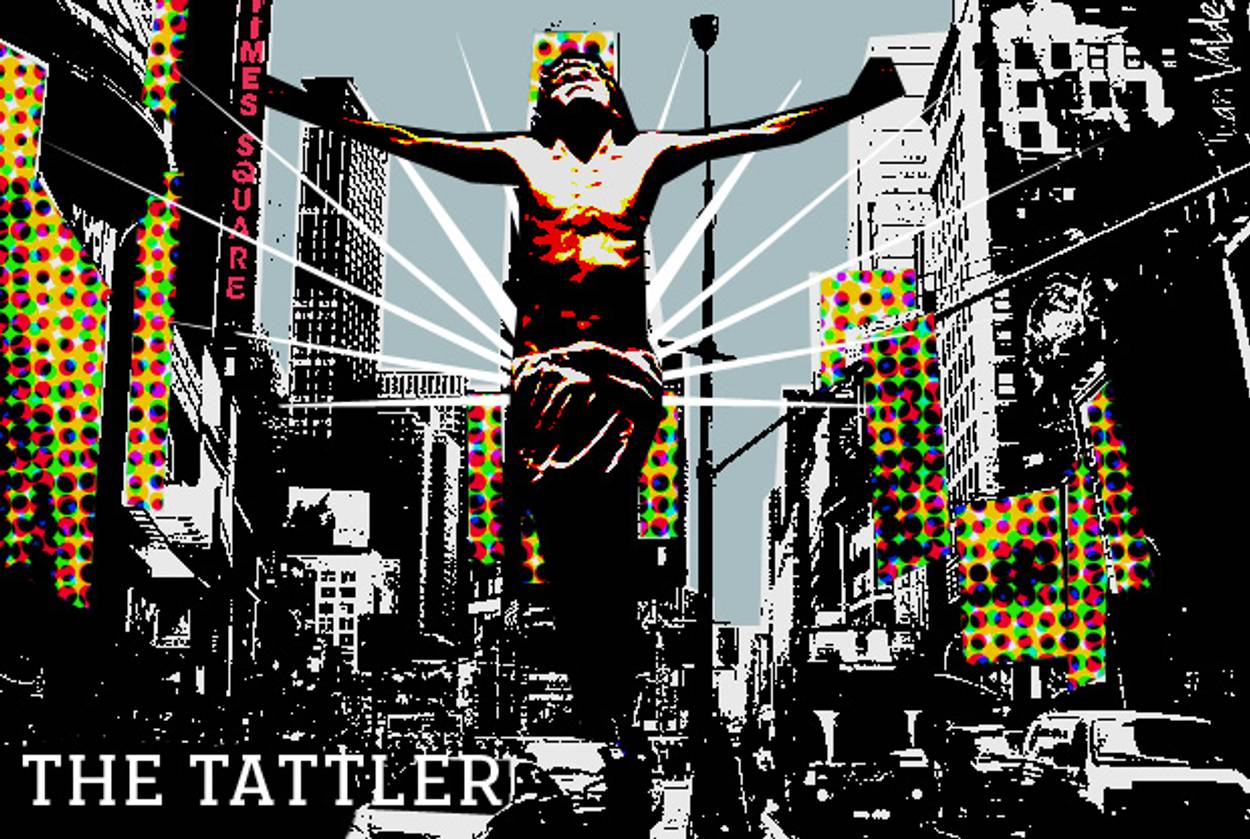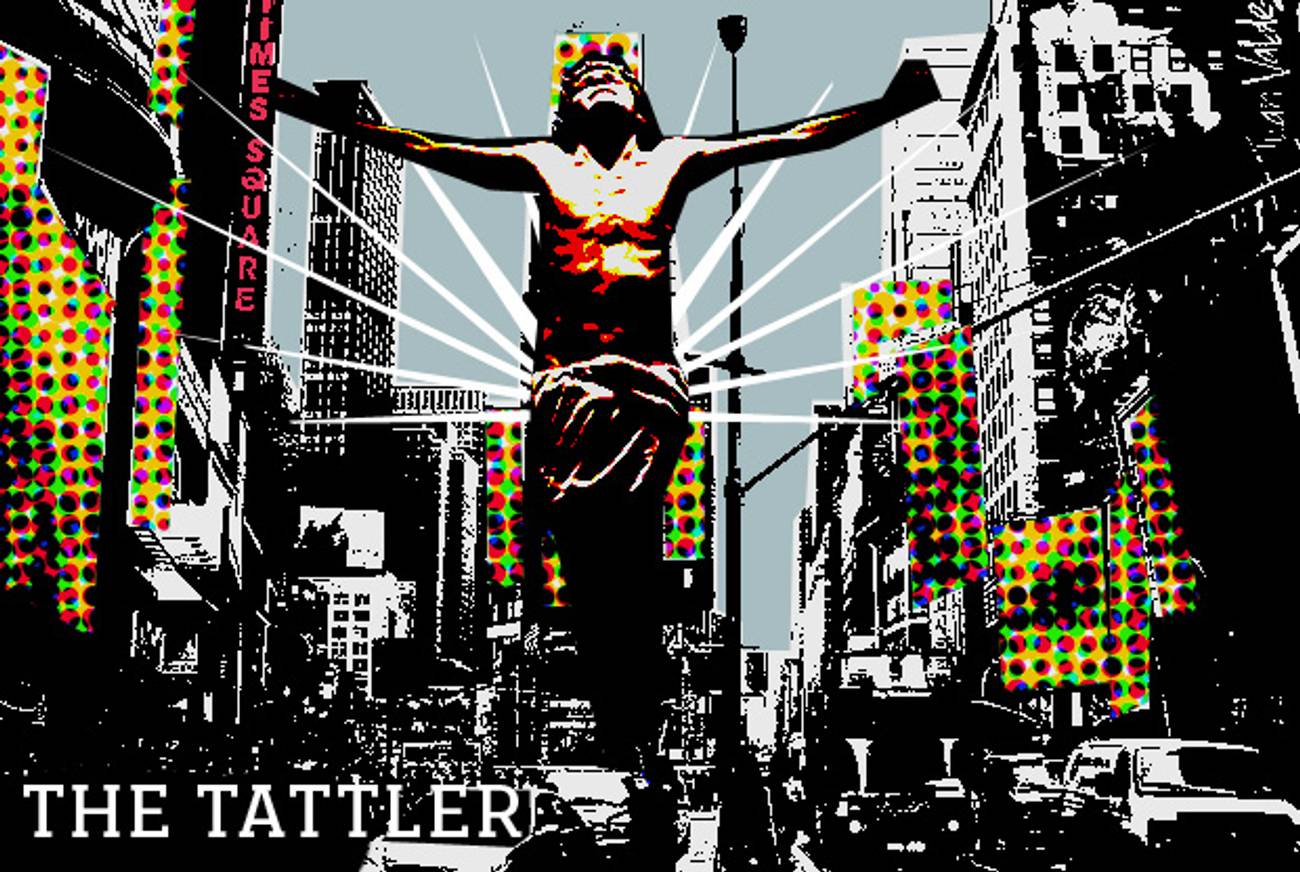Jesus Christ!
The Son of God takes Manhattan—from Bigger Than Jesus to Godspell—and the people blamed for his death wonder where to turn




You can’t say we weren’t warned. No less an authority than Neil Patrick Harris told us in his hilarious opening number at last year’s Tony Awards: Broadway is “not just for gays anymore” (or the gays and the Jews, or cousins in from out-of-town you have to amuse …). Instead, it is now for those of us theater lovers who naively assumed the election of President Barack Obama had forever stanched the toxic religiosity that washed over us during the George W. Bush Administration like the flood waters of Lake Pontchartrain. A recent Tweet from New York Times theater editor Scott Heller points out that when Bigger Than Jesus, self-described “progressive Christian” Rich Miller’s one-man exploration of the life of Christ, opens at NYU’s Skirball Center this weekend, there will be four, count ’em, four separate depictions of Sons of God spreading the Good News to an audience who normally hears the word “Messiah” and thinks “Sondheim.” A single Jewish boy hasn’t dominated the New York stage like this since Neil Simon in 1966.
With so many Christ-figures running around Manhattan, where can your average Jew get maximum discomfort with the infectious suggestibility of Christianity and a vague sense of complicity in the horrific death of its prophet for her theater-going dollar? Simply put, if you’re going to see only one Jesus this Passover season, which one should it be?
I haven’t seen Bigger Than Jesus, and God knows I’m all for progressive Christianity—they are, after all, the people who gave us Kristin Chenoweth—but from what I can glean from the press materials, it seems to be, quite literally, preaching to the converted, so that’s out. Ditto The Book of Mormon, which is hilarious and wonderful, but takes as its subject a religion that is almost flatteringly Judaic in its relegation of Jesus to the background; a pleasant, even inspired fellow, but ultimately beside the point. Godspell? Don’t even talk to me about Godspell. As a still shell-shocked veteran of the community theater of the lower Midwest, I consider myself a Godspell survivor, and if you think it’s offensive to use that term in light of not-so-recent events, then you clearly haven’t seen Godspell lately. As for the new, relentlessly cheerful, “updated” production (i.e., fewer painfully earnest hippie references, more painfully earnest Facebook references) I think The New Yorker’s Michael Schulman said it best outside the theater immediately following the performance: “It made me homesick for New York.”
Which leaves us with the moody, rock-star Jesus of Jesus Christ Superstar. To watch Paul Nolan, the actor playing Jesus, roaming the stage with the straggly mane of a wet lion and white T-shirt cut to bare a generous expanse of pectoral cleavage, like Russell Brand at a Kabbalah retreat, is to understand something of the seductive message of Christianity, of the genius of offering up not a thundering abstraction demanding one’s fealty to hard-to-find blue dye or adherence to arbitrary and onerous kitchen configurations, but a young, hot dude who lets you anoint him with fragrant oil and bury your face in his chest hair while he listens to you talk about your feelings (whether the rampant homophobia in some strains of Christianity developed in reaction to some essential homoeroticism embedded in the theology itself is a discussion worth having, but we’ll leave it in another time).
The apostles, also dressed in elaborately ruched and unexpectedly revealing knitwear, relate to Jesus and to each other with the furtive intensity of teenagers on the last night of summer camp; hushed conversations, lingering hugs, the contagious, unspoken sense that this has been the Most. Important. Time. Of their lives. You want to be a part of it. I certainly did, and so did the guy sitting in front of me, mouth open in holy ecstasy, leaning so far forward in his seat that the ballpoint pen tucked in the breast pocket of his short-sleeved sport shirt threatened to tumble over the mezzanine balcony and blind some unsuspecting soul below (who would then, presumably, be hauled up on stage to be healed, so no harm done). It all stands in marked contrast with the dourness of the Jewish high priest Caiphas and his cronies, clad in the black turbans and heavy eyeliner favored by the more dashing members of the Taliban and dreadlocked payot. Who wants to rub olive oil on them?
The arrival of Caiphas is always a tense moment for any Jew watching a Jesus play, as he is the character who pokes a conspicuous hole in the rebuttal passed down for generations by fretful Jewish mothers to the children they feared would be accused as “Christ-killers.” The ancient Jewish establishment may not have technically killed Jesus, but it seems to me they pretty enthusiastically handed them over to the people who would and pressed the issue when it looked like Pontius Pilate’s resolve might weaken. (I’m just working from Tim Rice’s lyrics here, which are as likely to be divinely inspired as anything in the Bible, and share a similarly awkward sentence construction.) OK, so we killed him, no matter who signed the order and actually nailed him to that big light-up cross. I understand that, and after watching Jesus rise on a crucifix of light from the stage of … wait for it … the Neil Simon Theater for the first time, I accept it.
What I don’t understand, and what I refuse to accept, is why they were mad about it for so long. Jesus Christ Superstar, and by association, the Gospels, clearly argue that Jesus’ excruciating death was mandated by God (it wouldn’t have been the first time He asked for something unreasonable), the ultimate sacrifice that would cleanse the world of sin and usher in the Golden Age of the A.D.’s. The Crucifixion had to happen for Jesus to move from the realm of friendly Reconstructionist guitar-playing rabbi to Our Lord and Savior; the only trouble is that nobody seemed to quite have the balls to go through with it on their own: not Pilate, not poor conflicted Judas, not even Jesus himself. Of all the leaders of Judea, only one man stood above the fray, was doctrinaire, unyielding, and certain enough of his divine rectitude (all excellent qualities for a pope, I might add) to put personal scruples aside and get that hippie on the cross where he belonged.
Forget St. Peter: St. Caiphas was the real rock upon which he built his Church. And frankly, I’m still waiting for my thank-you note.
***
Like this article? Sign up for our Daily Digest to get Tablet Magazine’s new content in your inbox each morning
Rachel Shukert, a Tablet Magazine columnist on pop culture, is the author of the memoirs Have You No Shame? and Everything Is Going To Be Great. Starstruck, the first in a series of three novels, is new from Random House. Her Twitter feed is @rachelshukert.
Rachel Shukert is the author of the memoirs Have You No Shame? and Everything Is Going To Be Great,and the novel Starstruck. She is the creator of the Netflix show The Baby-Sitters Club, and a writer on such series as GLOW and Supergirl. Her Twitter feed is @rachelshukert.